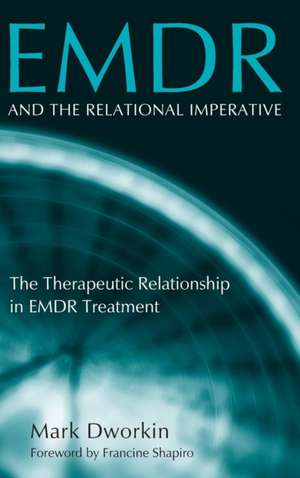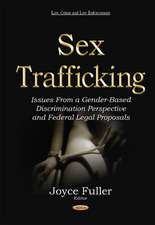EMDR and the Relational Imperative: The Therapeutic Relationship in EMDR Treatment
Autor Mark Dworkinen Limba Engleză Hardback – 13 sep 2005
| Toate formatele și edițiile | Preț | Express |
|---|---|---|
| Paperback (1) | 360.05 lei 22-36 zile | +20.69 lei 6-12 zile |
| Taylor & Francis – 3 sep 2013 | 360.05 lei 22-36 zile | +20.69 lei 6-12 zile |
| Hardback (1) | 384.83 lei 22-36 zile | +32.74 lei 6-12 zile |
| Taylor & Francis – 13 sep 2005 | 384.83 lei 22-36 zile | +32.74 lei 6-12 zile |
Preț: 384.83 lei
Preț vechi: 405.08 lei
-5% Nou
Puncte Express: 577
Preț estimativ în valută:
73.64€ • 77.09$ • 60.93£
73.64€ • 77.09$ • 60.93£
Carte disponibilă
Livrare economică 17-31 martie
Livrare express 01-07 martie pentru 42.73 lei
Preluare comenzi: 021 569.72.76
Specificații
ISBN-13: 9780415950282
ISBN-10: 0415950287
Pagini: 322
Ilustrații: 1 Tables, black and white
Dimensiuni: 152 x 229 x 23 mm
Greutate: 0.76 kg
Ediția:1
Editura: Taylor & Francis
Colecția Routledge
Locul publicării:Oxford, United Kingdom
ISBN-10: 0415950287
Pagini: 322
Ilustrații: 1 Tables, black and white
Dimensiuni: 152 x 229 x 23 mm
Greutate: 0.76 kg
Ediția:1
Editura: Taylor & Francis
Colecția Routledge
Locul publicării:Oxford, United Kingdom
Public țintă
Professional Practice & DevelopmentCuprins
Shapiro, Foreword. Preface. Acknowledgements. The Relational Imperative in EMDR. The Therapeutic Relationship and its Underlying Neurobiology. Using EMDR Relationally in Daily Clinical Practice. Phase One: Client History Taking and Treatment Planning (Trauma Case Conceptualization). Phase Two: Client Preparation (Testing Affect Tolerance and Body Awareness). Phase Three: Assessment (Trauma Activation Sequence). Phase Four: Desensitization (Active Trauma Processing). Counter-transference, Transference and the Intersubjective. The Relational Interweave and Other Active Therapeutic Strategies. Phase Five: Through Phase Eight: Installation (Linking to the Adaptive Perspective), the Body Scan (Intensive Body Awareness) Closure (Debriefing), and Re-evaluation. Appendix A: Trauma, PTSD, and Complex PTSD. Appendix B: The EMDR International Association and the Definition of EMDR. Appendix C: Myths and Realities about EMDR. Appendix D: EMDR Clinical Applications for Diverse Clinical Populations. Appendix E: Confusion Regarding Research on EMDR. Appendix F: Trauma Case Conceptualization Questionnaire. Appendix G: Clinician Self-awareness Questionniare. Appendix H: International Treatment Guidelines and EMDR Research. Appendix I: EMDR Clinician Resources: The Humanitarian Assistance Program. Glossary. References. Notes. Index.
Recenzii
'This book provides a practical, clinically rich framework that will enhance the beginning and experienced clinician’s ability to utilize EMDR. A must-read for all EMDR clinician’s.' - Roger M. Solomon, Senior Faculty, EMDR Institute, USA
In the book, "EMDR AND THE RELATIONAL IMPERATIVE" Mark Dworkin teaches us valuable tools, such as the relational interweave, to manage these transferential blocks and self regulating skills for EMDR clinicians to use when countertransference is awakened.
The author interweaves an excellent revision of EMDR methodology - phase by phase- with the relational issues which contribute to ascertain good results, and if unhindered, are responsible for many bad results.
Many South American EMDR practitioners coming from psychoanalysis will find in this book familiar terms, being addressed though from an EMDR perspective, making it a must for those colleagues seeking to integrate different perspectives of the same phenomenon: the enormous value of the therapeutic relation.
Mark Dworkin’s thorough knowledge, profoundly humane stance and acute clinical expertise are evident throughout this book.
Book reviewed by Carina Mitrani PhD
'This book provides a practical, clinically rich framework that will enhance the beginning and experienced clinician’s ability to utilize EMDR. A must-read for all EMDR clinician’s.' - Roger M. Solomon, Senior Faculty, EMDR Institute
In the book, "EMDR AND THE RELATIONAL IMPERATIVE" Mark Dworkin teaches us valuable tools, such as the relational interweave, to manage these transferential blocks and self regulating skills for EMDR clinicians to use when countertransference is awakened.
The author interweaves an excellent revision of EMDR methodology - phase by phase- with the relational issues which contribute to ascertain good results, and if unhindered, are responsible for many bad results.
Many South American EMDR practitioners coming from psychoanalysis will find in this book familiar terms, being addressed though from an EMDR perspective, making it a must for those colleagues seeking to integrate different perspectives of the same phenomenon: the enormous value of the therapeutic relation.
Mark Dworkin’s thorough knowledge, profoundly humane stance and acute clinical expertise are evident throughout this book.
Book reviewed by Carina Mitrani PhD
'This book provides a practical, clinically rich framework that will enhance the beginning and experienced clinician’s ability to utilize EMDR. A must-read for all EMDR clinician’s.' - Roger M. Solomon, Senior Faculty, EMDR Institute
Notă biografică
Mark Dworkin, CSW, LCSW, is currently a Senior Facilitator at the EMDR Institute, maintains a private practice in East Meadow, New York and is a Diplomate in Clinical Social Work (NASW) and a Diplomate and Past President of the Nassau County chapter of the New York State Society for Clinical Social Work. Mr. Dworkin currently serves on the Board of Directors of the Eye Movement Desensitization and Reprocessing International Association (EMDRIA).
Descriere
In this groundbreaking work, Mark Dworkin, an EMDR teacher, facilitator, and long-time practitioner, explores the subtle nuances of the therapeutic relationship and the vital role it plays in using Eye Movement Desensitization and Reprocessing (EMDR) with taumatized clients.









